-
Dealing with man-made earthquakes
Between 1967 and 2000, central and eastern United States experienced on average 20 earthquakes above a magnitude 3.0 a year. Between 2010 and 2012, the number of earthquakes above a magnitude 3.0 in these regions has dramatically increased to an average of 100 a year. This increase in earthquakes prompts two important questions: Are they natural, or man-made? And what should be done in the future as we address the causes and consequences of these events to reduce associated risks?
-
-
Climate change, severe weather threaten U.S. energy sector: Dept. of Energy
The U.S. entire energy system is vulnerable to increasingly severe and costly weather events driven by climate change, according to a U.S. Department of Energy report published last week. These climate and weather trends — increasing temperatures, decreasing water availability, more intense storm events, and sea level rise — each independently, and in some cases in combination, could restrict the supply of secure, sustainable, and affordable energy critical to U.S. economic growth.
-
-
U.S. power plants use more coal, bucking the trend toward natural gas
Power plants in the United States are burning more coal to produce electricity, bucking the trend toward using natural gas, and in the process emitting more greenhouse gasses into the atmosphere, a new government report says. Burning coal to produce electricity was popular just a few years ago, but hydraulic fracturing led to a natural gas boom, driving down gas prices and making natural gas more competitive with coal. The demand for natural gas got so high, however, that its price began to creep up at the same time that the price of coal dropped because of weakening demand for it.
-
-
Japan to restart nuclear power plants
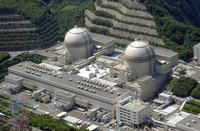
Japan’s fifty nuclear power plants were taken off-line in the wake of the 2011 Fukushima nuclear disaster, but the government Prime Minister Shinzo Abe, which took office in December, said it was planning to restart Japan’s nuclear power generation program.
-
-
Quebec deadly accident revives pipeline vs. rail debate

The sharp increase in U.S. domestic oil production in the last four years, and the opening by the Obama administration of new areas for drilling, have greatly benefitted U.S. rail companies, which now enjoy the added business of transporting oil from places where pipelines do not exist.U.S. domestic shipments of oil have increased from 9,500 carloads in 2008 to more than 230,000 carloads last year. The deadly Lac-Megantic, Quebec crude-oil train accident revives the debate about the relative safety merits of two modes of transporting oil over long distances – rail vs. pipeline. Proponents of the Keystone XL pipeline project say the Quebec accident will boost support for their cause.
-
-
“Peak oil” concerns should ease: study

Fears of depleting the Earth’s supply of oil are unwarranted, according to new research, which concludes that the demand for oil — as opposed to the supply — will reach its own peak and then decline. “Peak oil” prognosticators have painted pictures of everything from a calm development of alternatives to calamitous shortages, panic and even social collapse as the world reaches its peak of oil production – and then supplies fall.
-
-
Oil-devouring microbe communities a mile deep in the Gulf
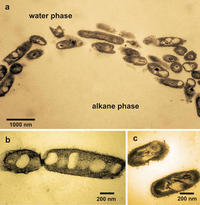
The Deepwater Horizon explosion on 20 April 2010, caused the largest marine oil spill in history, with several million barrels of crude oil released into the Gulf of Mexico over the course of three months. Soon after the spill began, a massive oil slick was visible from orbiting satellites, yet once the underwater gusher was sealed, obvious traces of the crude oil disappeared much sooner than nearly all observers predicted. Some of the oil evaporated; some was skimmed off. Microbes “ate” much of the oil as well.
-
-
U.S. geological carbon dioxide storage potential
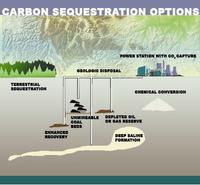
The United States has the potential to store a mean of 3,000 metric gigatons of carbon dioxide (CO2) in geologic basins throughout the country. Technically accessible storage resources are those that can be accessed using today’s technology and pressurization and injection techniques. The most common method of geologic carbon storage involves pressurizing CO2 gas into a liquid, and then injecting it into subsurface rock layers for long-term storage.
-
-
U.S. tax code has minimal effect on CO2, other greenhouse gas emissions
Current federal tax provisions have minimal net effect on greenhouse gas emissions, according to a new report from the National Research Council. The report found that several existing tax subsidies have unexpected effects, and others yield little reduction in greenhouse gas emissions per dollar of revenue loss.
-
-
Renewables to surpass gas by 2016 in the global power mix: IEA

An International Energy Agency (IEA) report says power generation from hydro, wind, solar, and other renewable sources worldwide will exceed that from gas and be twice that from nuclear by 2016.
-
-
Transporting diluted bitumen through pipelines does not increase likelihood of release
Scientific study has found that the thick Canadian crude oil, known asdiluted bitumen, whichwould be shipped to the U.S. through the Keystone XL pipleline is no more dangerous than transporting other types of crude oil.
-
-
Environmentalists begin a summer of protest against Keystone project
A coalition of environmentalist groups calling itself “fearless summer” launched what it said would be a series of protests against the Keystone XLL pipeline project. Near the city of Seminole, Oklahoma, members of the group shackled themselves to industrial equipment and disruoted work at Keystone-related construction site. Ten were arrested.
-
-
Policy, regulatory issues hobble hydropower as wind-power backup
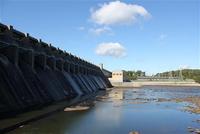
Theoretically, hydropower can step in when wind turbines go still, but barriers to this non-polluting resource serving as a backup are largely policy- and regulation-based, according to researchers.
-
-
Methane, ethane, and propane found in water wells near shale gas sites
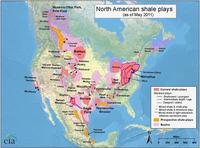
Homeowners living within one kilometer of shale gas wells appear to be at higher risk of having their drinking water contaminated by stray gases, according to a new study. Scientists analyzed 141 drinking water samples from private water wells across northeastern Pennsylvania’s gas-rich Marcellus shale basin. Their study documented not only higher methane concentrations in drinking water within a kilometer of shale gas drilling — which past studies have shown — but higher ethane and propane concentrations as well.
-
-
An environmentally friendly battery made from wood
Taking inspiration from trees, scientists have developed a battery made from a sliver of wood coated with tin that shows promise for becoming a tiny, long-lasting, efficient and environmentally friendly energy source. Their report on the device — 1,000 times thinner than a sheet of paper — appears in the journal Nano Letters.
-
- All
- Regional
- Water
- Biometrics
- Borders/Immig
- Business
- Cybersecurity
- Detection
- Disasters
- Government
- Infrastructure
- International
- Public health
- Public Safety
- Communication interoperabillity
- Emergency services
- Emergency medical services
- Fire
- First response
- IEDs
- Law Enforcement
- Law Enforcement Technology
- Military technology
- Nonlethal weapons
- Nuclear weapons
- Personal protection equipment
- Police
- Notification /alert systems
- Situational awareness
- Weapons systems
- Sci-Tech
- Sector Reports
- Surveillance
- Transportation
Advertising & Marketing: advertise@newswirepubs.com
Editorial: editor@newswirepubs.com
General: info@newswirepubs.com
2010-2011 © News Wire Publications, LLC News Wire Publications, LLC
220 Old Country Road | Suite 200 | Mineola | New York | 11501
Permissions and Policies
Editorial: editor@newswirepubs.com
General: info@newswirepubs.com
2010-2011 © News Wire Publications, LLC News Wire Publications, LLC
220 Old Country Road | Suite 200 | Mineola | New York | 11501
Permissions and Policies
